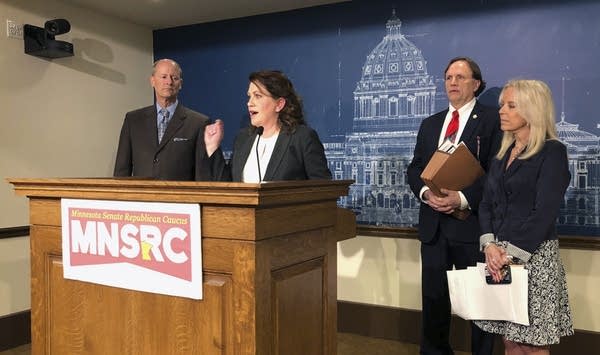Minnesota Senate Republicans tout human services budget bill

Go Deeper.
Create an account or log in to save stories.
Like this?
Thanks for liking this story! We have added it to a list of your favorite stories.
Minnesota Senate Republicans said Tuesday that their health and human services budget bill would provide good care for the elderly, the disabled and children who need it while cracking down on fraud and waste.
The bill, which was expected to pass on party lines, also contains language to prohibit most abortions after 20 weeks of pregnancy, stating that a fetus at that stage of development is capable of feeling pain. The provision is not expected to survive the end-of-session negotiations with the House Democratic majority, which voted down similar language during the debate on its health and human services budget last week.
As with almost all the budget bills the House and Senate have been working to pass by Wednesday's deadline, the Senate's health and human services bill sets up challenging negotiations to reconcile the differences with the House bill. The Senate version is funded with existing revenues, without renewing an expiring tax on health care providers that generates about $700 million a year to help fund health care programs as the House would do.
Sen. Michelle Benson, who chairs the Senate Health and Human Services Committee, said her bill makes "some tough choices and significant reforms" and "trims" the growth of the Department of Human Services.
Turn Up Your Support
MPR News helps you turn down the noise and build shared understanding. Turn up your support for this public resource and keep trusted journalism accessible to all.
Still, the Ham Lake Republican said, it spends $1.6 billion more than the current two-year budget, which runs through June 30. Programs currently funded by the state's Health Care Access Fund, which comes from the provider tax, would transition to getting their money from the state's general fund instead, she said.
Democratic Gov. Tim Walz said last week that he won't compromise on preserving a permanent funding source for the Health Care Access Fund, which helps pay for Medicaid and the MinnesotaCare program for the working poor, though he's open to discussing an alternative funding mechanism.
The Senate bill seeks to crack down on fraud in the state's Child Care Assistance Program, which has been the subject of two sharply critical reports in recent weeks from the nonpartisan Office of the Legislative Auditor. The program helps low-income families afford child care while parents work or attend school. The bill would eliminate the program entirely next year unless the Department of Human Services fixes the program's vulnerabilities to fraud.
Families would gain the right to place video cameras in the rooms of loved ones at nursing homes and other facilities to ensure they're not being abused or neglected under a provision from Sen. Karin Housley, a Republican from St. Mary's Point.
The Senate bill does not include Walz's proposed ONEcare public option buy-in health insurance program that would be an alternative to private insurance plans, nor does it include a House-passed ban on so-called gay conversion therapy for minors and vulnerable adults. And it would eliminate dental coverage for adults on Medicaid or MinnesotaCare.
Senate Majority Leader Paul Gazelka said they're trying to "thread that needle" between the benefits they want to provide and the rights of taxpayers.
"This is a very thoughtful bill, dealing with very, very difficult situations," the Nisswa Republican said.
Dear reader,
Political debates with family or friends can get heated. But what if there was a way to handle them better?
You can learn how to have civil political conversations with our new e-book!
Download our free e-book, Talking Sense: Have Hard Political Conversations, Better, and learn how to talk without the tension.



